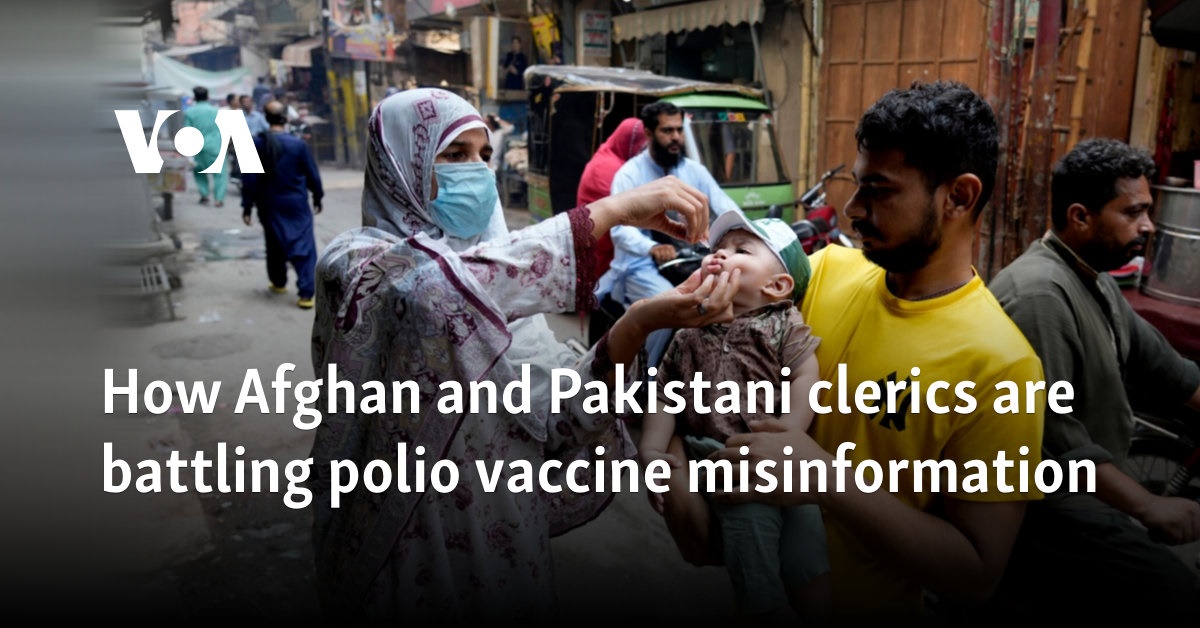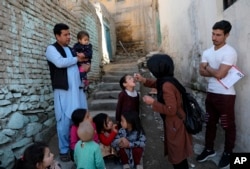Maulana Tayyab Qureshi, the top cleric in Pakistan’s Khyber Pakhtunkhwa Province, has seen up close the devastating effects of polio.
Two of his own kin were once paralyzed, victims of a scourge that has been vanquished worldwide yet refuses to go away from Pakistan and neighboring Afghanistan.
“Had their parents not neglected [to have their children vaccinated], their children wouldn’t be disabled today,” Qureshi said of his relatives.
As the chief khateeb, or Friday prayer leader, of the northwestern province, Qureshi preaches this message at every opportunity — Friday sermons at his 17th century Mahabat Khan Mosque in Peshawar, Eid prayers when upward of 40,000 people congregate, meetings with village elders.
“I’m very clear cut: I tell them, it’s free. It doesn’t cost you anything. Why don’t you take it seriously?” Qureshi said in an interview with VOA.
Qureshi is not the only Pakistani cleric advocating vaccination. Several renowned scholars have issued decrees in its support, with a notable shift in attitudes. Vaccine hesitancy, an intractable obstacle to eradicating polio, has waned, he said.
A once infamous bastion of vaccine resistance outside Peshawar has now embraced immunization.
“The fatwas have had a great impact,” Qureshi said.
Yet, as Pakistan and Afghanistan seek to eradicate polio, misinformation remains a key hurdle. While immunization rates are generally high in both countries, pockets of resistance persist along the border, jeopardizing eradication efforts.
To counter vaccine misinformation, public health officials increasingly have turned to influential clerics like Qureshi. As the trusted voices within their communities, these religious leaders play a crucial role in dispelling harmful myths and misconceptions about vaccines, experts say.
“The best way to fight through this is empowering trusted voices in communities to push back on it and provide real information,” said Kai Ruggeri, a Columbia University health policy professor who has written about vaccine disinformation.
The stakes are high. Afghanistan and Pakistan are the only countries where polio remains endemic. And as World Polio Day arrives this year, there are renewed concerns over their ability to eliminate the disease.
The neighboring countries were once on the brink of going polio-free. But persistent insecurity coupled with cross-border movements has fueled a resurgence.
Pakistan has recorded 40 cases and Afghanistan at least 20, this year. This marks a significant increase from the six cases each reported last year.
A setback came last month when more than 1 million Pakistani children missed vaccinations, and Afghanistan’s Taliban briefly suspended immunization campaigns.
Oliver Rosenbauer, a spokesman for WHO’s polio eradication program in Geneva, noted that misinformation is not the only obstacle to eliminating polio; a lack of infrastructure, insecurity and population density also contribute.
“The important point is the polio virus doesn’t care why a child is not vaccinated,” Rosenbauer said in an interview. “It’s very, very good at finding that unvaccinated child.”
Polio, a crippling disease that can lead to paralysis and death, has long been eradicated globally thanks to universal immunization efforts. For most people around the world, polio is a distant memory or even a relic of history.
But in Afghanistan and Pakistan, the disease remains a stark reality despite significant progress in recent decades. Its scars are visible to those who look, Rosenbauer said.
“It’s a disease that parents still see,” he said. “If you walk around Karachi or Kabul, you’ll still see people with polio on the streets.”
This “respect for the disease” explains why vaccine hesitancy remains around 1.5% in Afghanistan and Pakistan, significantly lower than many Western countries.
Yet in densely populated areas, such as the border regions of Afghanistan and Pakistan, lingering resistance can prevent efforts to eradicate the virus.
Leading the charge against the vaccine, militants on both sides of the border have waged violent attacks on polio workers and their escorts. Their claim that the vaccine program violates Islamic law and is used for surveillance has fueled resistance.
Hundreds have been killed in both Pakistan and Afghanistan.
In January, at least five policemen were killed and more than a dozen injured in a major attack on polio teams and security personnel in northwestern Pakistan.
According to the Emergency Operations Center in Khyber Pakhtunkhwa, militants have carried out 21 attacks against polio teams and security escorts in Pakistan this year.
Mainstream clerics have pushed back.
In 2019, prominent Islamic scholars from Afghanistan and Pakistan declared the polio vaccine safe and Sharia-compliant. They stressed the “moral duty” of parents to have their children vaccinated.
In 2022, the al-Azhar University, the Sunni Muslim world’s most prestigious institution of religious education, warned against decrees banning the polio vaccine in Pakistan.
Last month, nearly 200 renowned religious scholars in Khyber Pakhtunkhwa declared support for polio vaccination.
Qureshi, the chief khateeb of KP, was among them.
The scholars “took a strong stand not only regarding the polio vaccine but all health measures by the ministry of health,” Qureshi said.
Across the border, Taliban health officials are waging their own campaign against vaccine misinformation even as attacks on health workers, often claimed by ISIS, have persisted.
Ehsanul Haq Hanafi, a cleric and senior official in the health ministry, understands the clergy’s influence in Afghan society.
“People listen to the ulema and accept what they say,” Hanafi said in an interview with VOA.
Among the myriad misconceptions about the vaccine, he said, some Afghans believe it corrupts morals or causes sterility. Others think it can accelerate puberty, he said.
“This is unscientific and baseless disinformation,” he said.
To combat this, Hanafi travels around the country to meet with locals and mullahs to convince the skeptics. While some clerics remain opposed, most accept the vaccine once its benefits are explained, he said.
“We can’t convince 100% of the people, but 80% agree with us and have their children vaccinated,” Hanafi said.
VOA’s Ihsan M. Khan contributed to this article.








